
A mother whose daughter was born with a rare chromosome disorder meaning she is non-verbal and has scoliosis along with a painful nerve condition said it is “too heart-wrenching” to think about the future.
Stella Tikkirou and her partner, George Vasili, welcomed their now 11-year-old daughter, Penelope Vasili, in 2014, but Stella said she “knew something was wrong” with her daughter’s health even before she was born as she was “coming up quite small” on her final ultrasound scans.
The couple, who are engaged and live in Kingston upon Thames, London, noticed Penelope was “always so upset and really unsettled” as a baby, and at around six months old, Stella realised she “wasn’t really holding herself up”, describing Penelope as “a little floppy rag doll”.
Stella, who is an apprentice Pilates teacher alongside being a full-time carer for her only child, said she took Penelope to see a doctor several times but after visiting a different GP, they were instantly referred to a paediatrician.
After several tests, Penelope was diagnosed with a rare chromosome disorder which causes intellectual and physical defects – and Penelope is non-verbal, has low muscle tone, scoliosis and a rare, painful nerve condition which feels like “tendons snapping when it’s happening”.
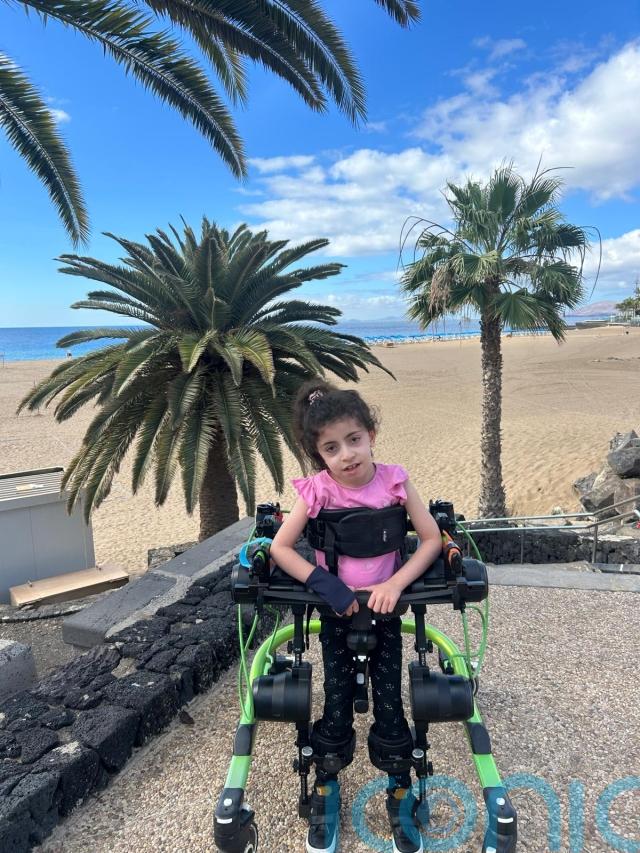
Stella and George, a coffee barista, have periodically enrolled Penelope on an intensive physiotherapy programme based in Los Angeles in the United States since 2018, but as this can cost anywhere between £10,000 to £15,000 per trip, they have launched a fundraiser to allow her progression to continue.
“You can really drive yourself crazy thinking about the future and it’s really painful to go there,” Stella told PA Real Life.
“The way we’ve dealt with this is to shower Penelope in love and take each day as it comes.
“We’re in survival mode, it’s just one foot in front of the other.
“I try not to think about what she’ll be like when she’s 18, when she’s 30…no one really knows, and it’s a bit too heart-wrenching for me to go there.”
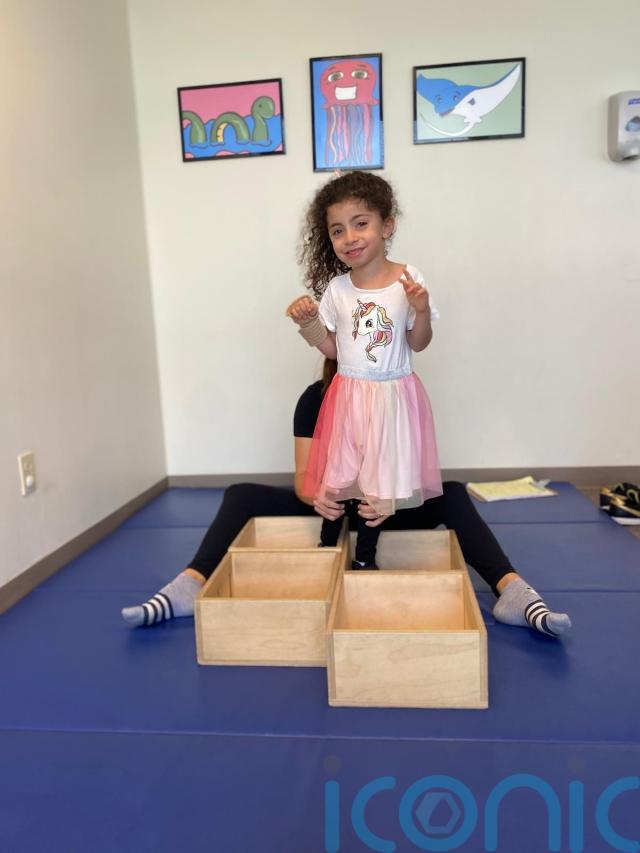
Stella described her daughter as a “very sweet little girl”.
“She’s very happy, she’s very giggly,” Stella said.
“She’s a real foodie, she loves music, she loves being sung to, she loves being read to.”
Stella said she “knew something was wrong” with Penelope’s health even before she was born as she was “coming up quite small” on her final ultrasound scans.
Penelope was born with low body temperature and low blood sugar, Stella said, and the pair were kept in hospital for a week following her arrival.
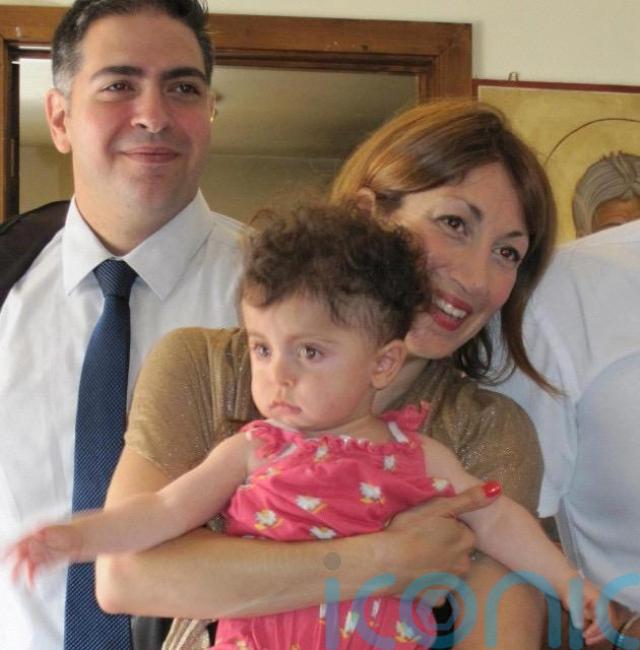
Stella said Penelope was also born with a “severe tongue tie”, and her tongue was “stuck to the bottom of her mouth”, making feeding difficult.
After undergoing a procedure to rectify her tongue tie, Stella said problems persisted with her daughter.
“I kept taking her back to the doctors because she was always so upset and really unsettled,” Stella said.
“She got to about six months old and I noticed she wasn’t really holding herself up, she was really floppy – like a little floppy rag doll.”
Stella said she then took Penelope to a different GP.
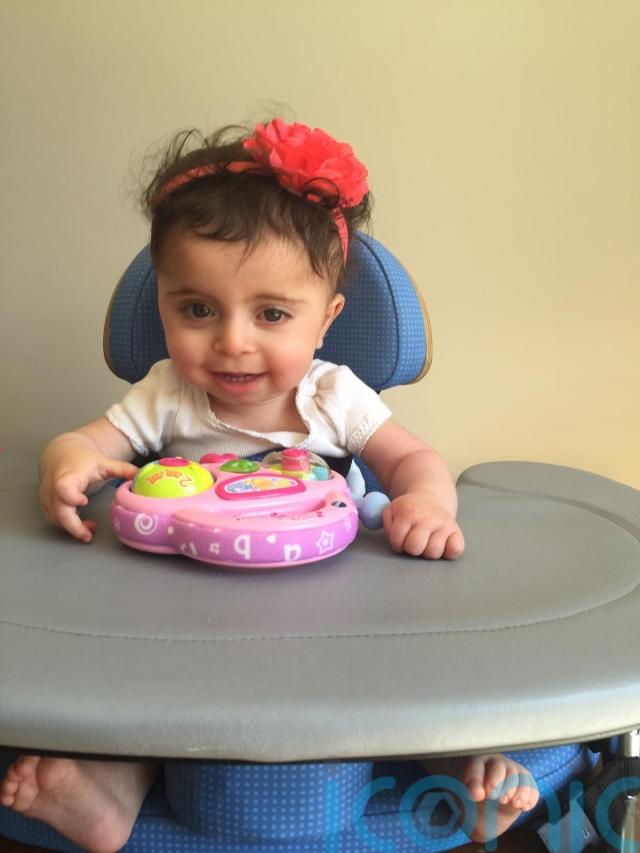
“They took one look at her and said ‘not to alarm you, but you’re right’,” Stella said, adding they were then referred to a paediatrician.
From there, Stella said Penelope underwent lots of tests and checks, before she was diagnosed with a rare chromosome disorder at 18 months old.
The disorder, named 8p inverted duplication and deletion syndrome, is a rare genetic condition that impacts every cell in the body, according to The Project 8p Foundation, a non-profit organisation researching 8p disorders.
In Penelope’s case, Stella explained the short arm of her chromosome 8 had broken off, inverted, then duplicated itself before deleting its terminus – the part at the very end of the chromosome.
This has then been replicated throughout every cell in Penelope’s body.
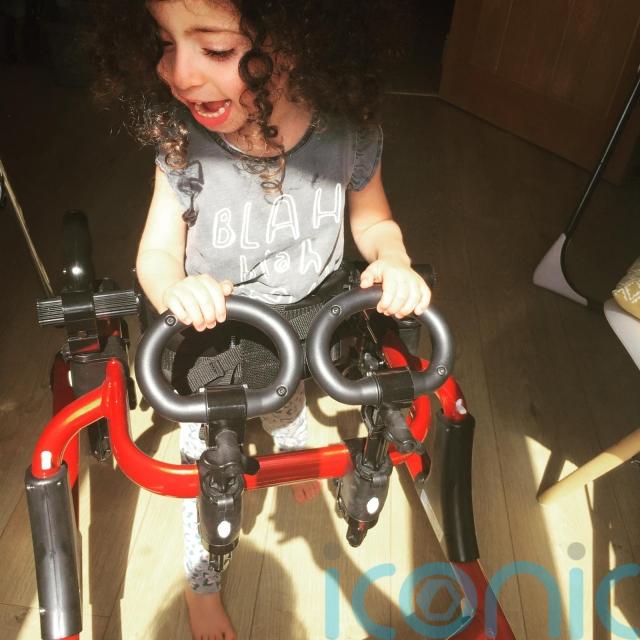
Penelope was also diagnosed with agenesis of the corpus callosum, meaning the bundle of nerves connecting the left and right hemispheres of her brain did not form correctly.
As a result of her diagnosis, Penelope is non-verbal – where she makes “lots of sounds” but she cannot formulate words – she has low muscle tone, scoliosis and a rare, painful nerve condition caused by a rare nerve disorder.
Penelope now uses Makaton sign language – which combines symbols, such as pictures, signs, such as gestures, and speech – to communicate.
She also uses an AAC (Augmentative and Alternative Communication) device, similar to an iPad.
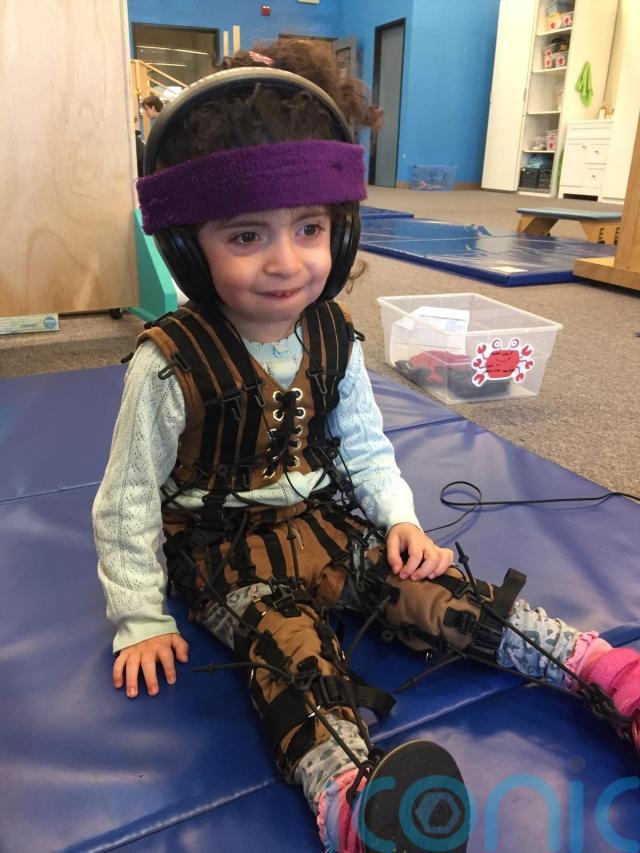
“The device is at a very basic level, such as ‘yes’, ‘no’, ‘more’, ‘finished’, ‘help’, ‘toilet’ – so she can tell us basic things,” Stella explained.
“We’ve also got a pain symbol on there and different body parts.
“She has a really rare nerve disorder and she gets shooting pains down her legs that feel like tendons snapping when it’s happening.
“She gets very upset, and she’ll point to ‘pain’ on her iPad and she’ll point to ‘legs’ to let us know she’s in pain.”
Stella added it is hard for her and George to see Penelope in pain.
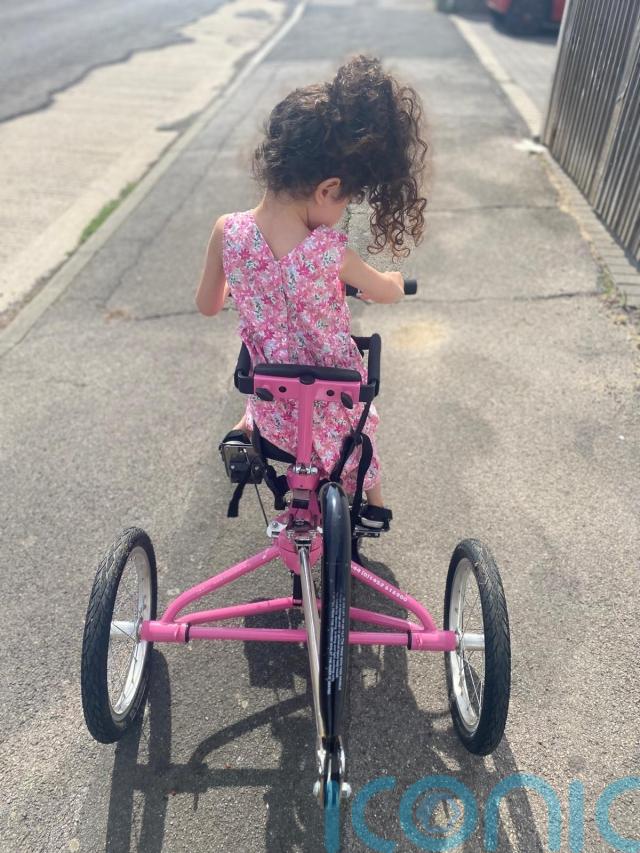
“It’s really hard to calm her down if she’s in pain because she’s non-verbal and she can’t tell us,” Stella said.
“It’s quite soul-destroying to watch and not be able to do anything to help.”
Stella said Penelope struggles to stay asleep with her condition, and she can wake from anywhere between eight to 12 times a night.
She is also “quite a small 11-year-old”, Stella said, adding she wears age seven to eight in children’s clothing.
Penelope now requires intensive physiotherapy to help build muscle and keep her strong.
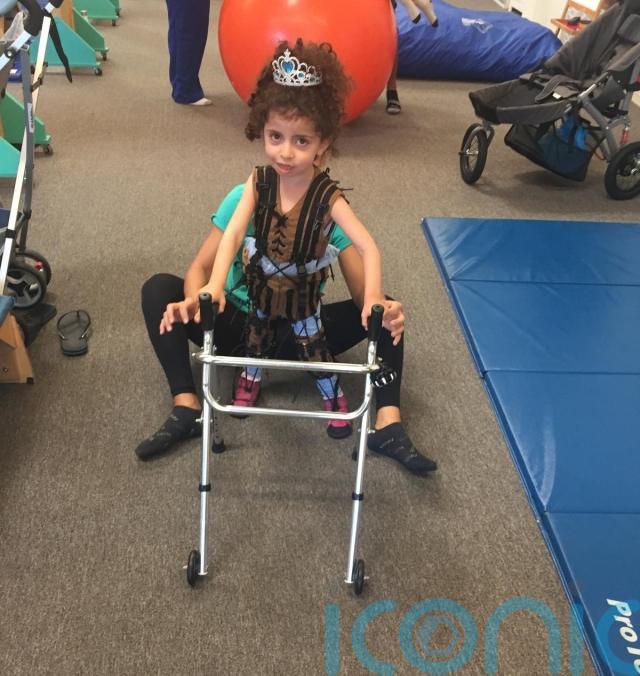
“Because her condition is so rare, we tend to go for intensive therapy blocks at a specialist physiotherapy clinic in Los Angeles,” Stella said.
There, Penelope undergoes a range of intensive physiotherapy sessions, including dynamic movement intervention therapy, speech and language therapy and feeding therapy.
“They’ve got lots of experience working with kids with her rare chromosome disorder, they’re just amazing with her,” she said.
“After our first therapy block, she made really great progress – she was able to use a walker and hold herself up – so her progress is ongoing.
“Obviously, the therapy costs loads of money so we’re always having to fundraise.”
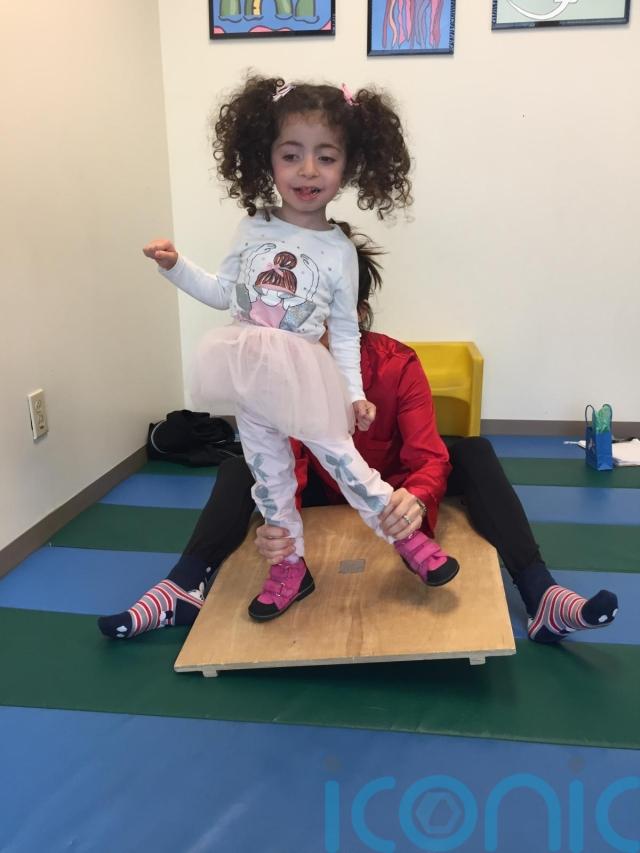
Stella said it costs between £10,000 to £15,000 for Penelope to attend one three-week therapy block at the clinic in Los Angles, which includes the costs of flights, accommodation and daily expenses.
Penelope has received six therapy blocks since January 2018, and the family periodically launch fundraisers to raise the money for their daughter to continue going.
The latest fundraiser, which took place on September 21 this year, revolved around a day of Pilates classes where those attending were asked to donate £15 per class.
The page has raised more than £8,000 so far, and Penelope is currently on the waitlist to attend another therapy block at the clinic.
In her advice to other parents, Stella said: “I’m a strong believer of mother’s instinct, and if something doesn’t feel right with your child, you should definitely investigate.”
To find out more, visit the GoFundMe page for Penelope here: gofundme.com/f/help-penelope-walk-talk-thrive
Subscribe or register today to discover more from DonegalLive.ie
Buy the e-paper of the Donegal Democrat, Donegal People's Press, Donegal Post and Inish Times here for instant access to Donegal's premier news titles.
Keep up with the latest news from Donegal with our daily newsletter featuring the most important stories of the day delivered to your inbox every evening at 5pm.